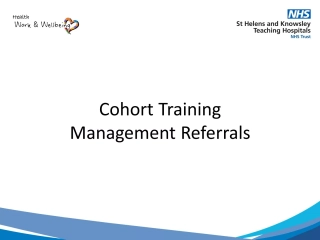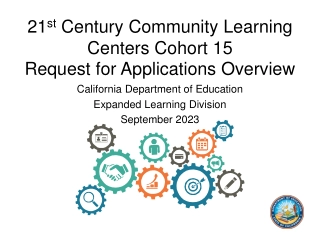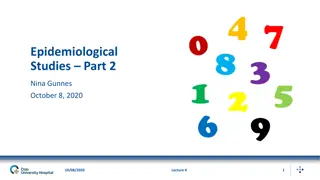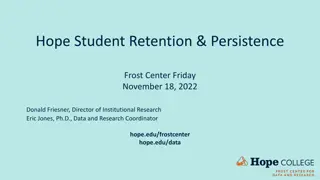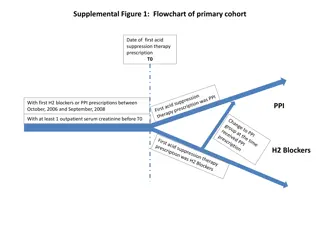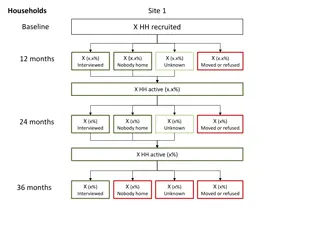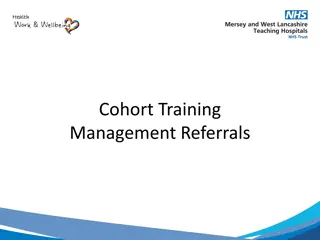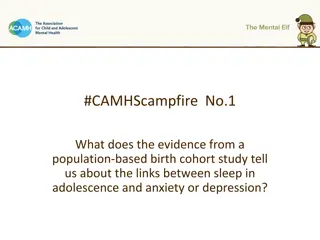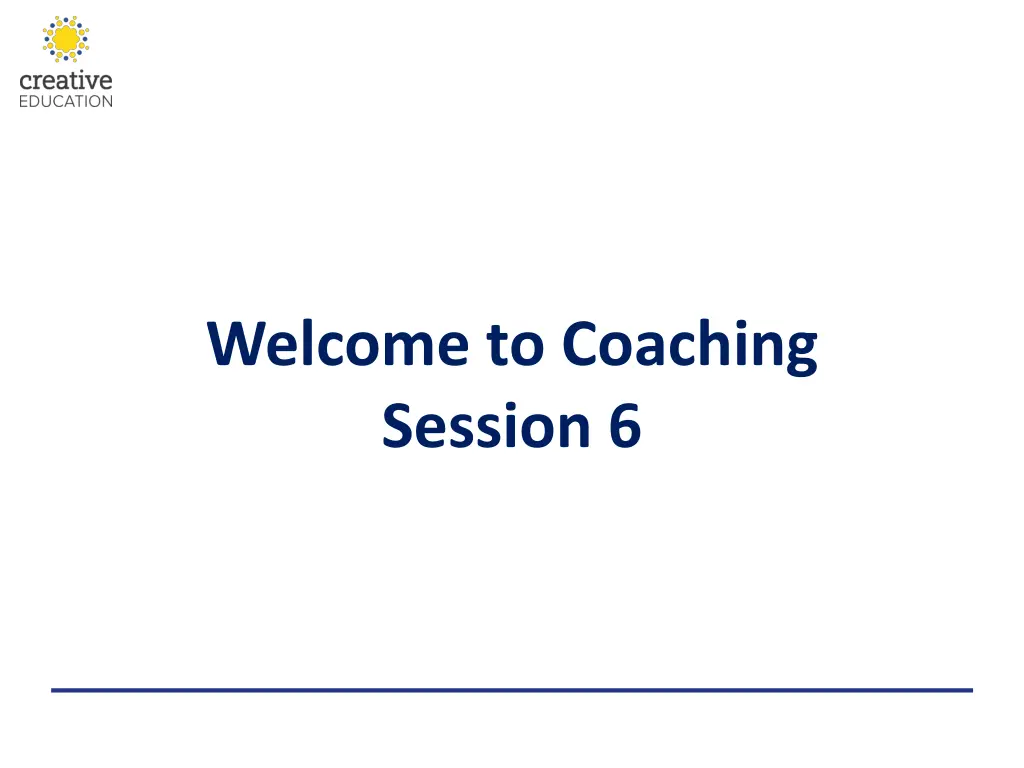
Enhancing Mental Wellbeing Through Education Sessions
Explore key learning moments from Session 6 coaching, focusing on staff mental wellbeing and student voice. Enhance mental health support strategies and promote diversity and respect in educational settings. Reflect on online courses, group agreements, and daily experiences to foster positive mental wellbeing.
Download Presentation

Please find below an Image/Link to download the presentation.
The content on the website is provided AS IS for your information and personal use only. It may not be sold, licensed, or shared on other websites without obtaining consent from the author. If you encounter any issues during the download, it is possible that the publisher has removed the file from their server.
You are allowed to download the files provided on this website for personal or commercial use, subject to the condition that they are used lawfully. All files are the property of their respective owners.
The content on the website is provided AS IS for your information and personal use only. It may not be sold, licensed, or shared on other websites without obtaining consent from the author.
E N D
Presentation Transcript
Welcome to Coaching Session 6
Session Overview Review key learning moments from on demand learning Run through a train the trainer for staff mental wellbeing Consider what support is available after today
Related DfE Learning outcomes LO6 Enabling the student voice so that the voice of every learner is heard and valued, and influences decisions. LO5 Creating an ethos and environment that promotes respect and values diversity. LO4 To support their own mental wellbeing, and that of pupils and students. LO7 Everyone works as a genuine team around pupils and students, with a consistency of approach and shared aims and strategies. LO8 Curriculum, teaching and learning to promote resilience and support social and emotional learning.
On Demand Learning Discussion Having considered these online courses: Get Health Education Right Improving engagement with parents and carers Child-centred Planning-Beyond Box Ticking Consider these points in small groups/pairs: 1. How can you find out from children and young people what matters to them? 2. What are the implications for delivering health education in your particular setting? What do you need to share with classroom teachers? 3. How can your school/college/education provision embody the values of nothing about me without me?
Group Agreement Listen to those around us Be non-judgmental Share if we feel comfortable to do so Be aware of your own mental health throughout Take a break if you need to do so Make a safe learning environment to make people feel able to be as honest as they would like to be.
Ever had an irritating clothing label? You are running late for work and notice an annoying clothing label. You leave it and run out of the door. You catch yourself scratching at it throughout the day. You intended on removing it at lunchtime but got caught up with something else.
How does it feel by the end of the day?
What does this have to do with mental wellbeing? Working in education can be both tough and rewarding. At times it can feel physically and emotionally difficult perhaps due to Safeguarding and Mental Health issues of young people the workload and more. The clothing label analogy reminds us of the need to take time each day to give ourselves the opportunity for self-care and to refill our batteries.
Why is staff mental wellbeing more important than ever before? The pandemic has had an impact on everyone to some extent. Even though these experiences and the way we process them will be unique to each of us, it is important that we think of ourselves too so that we can continue to support children and young people. Remember care and compassion for each other and ourselves.
What signs might show us a colleague is struggling? We need to take care not to generalise as each person will present differently but: Being more or less social than usual Isolating themselves from others Be Tearful Struggling to cope with change Find decision making challenging Low energy or concentration levels
Checklist for talking to a colleague about their mental wellbeing 1. Safe Space 2. Let them share what they want to and don t lead them with your questions 3. Listen without judgement Think back to a time when you really felt heard, what did the person do to validate your feelings? What help you feel heard? Add this to your checklist
Ensuring our own wellbeing... Research indicates that taking the following steps can be important in the promotion and maintenance of mental wellbeing: 1. Knowing your personal limits and having the ability to say No when necessary. 2. Identifying supportive people that you have in your life. Do you want to and / or need to increase support networks? 3. Talking there are times when challenging situations affect us emotionally. Talk to someone before leaving school / college. Separate work and homelife. 4. Being flexible around change. 5. Self-compassion. Take time to stop and reflect on thoughts in your head, are they more positive or critical?
What might you notice within yourself that might alert you to needing to share with someone else?
Signs within ourself that we are moving out of our window of tolerance Some examples are: Sleeping more or less Eating more or less Wanting to distance ourselves or spend more time with others Not able to switch off at the end of the day Differences in your inner thoughts e.g. feeling ashamed, underwhelmed etc...
What can you do to help yourself stay in the zone of tolerance?
Do you have a coping toolbox? Create mindful moments e.g body scans, paying full attention to the flavours and textures of your lunch (Or anything else you can do to create so moments just for yourself). Take short mindful walks pay attention to the sounds outside, the breeze on your face, the feel of the ground beneath you. Socially connect with colleagues: pop into someone s room to spark some joy for them, have a chat over coffee with a colleague. Make time. What else could go in your coping toolbox?
Does having more rest or more family time make you more effective?
Role Modelling Charging our batteries, being a wellbeing role model for young people and getting enough sleep has been found to significantly enhance performance and our ability to organise ourselves in more effective ways so that work doesn t consume our whole week. However, there is lots more to this than looking after our health.
To dont list Are there work-based activities that you do that don t really need to be done? We need to be honest about what we don t need to do. Could a to don t list work for you?
Recognising our limits Knowing personal limits and having the ability to say no when necessary is important. This helps you to have more balance in life and will enable you to take better care of others. Self-compassion. If you take some time to stop and reflect on the thoughts in your head, are they more positive or critical? Once you have identified any negative thought, you can begin to introduce more positive thoughts and turn the volume down on the critical voices.
If you had a new member of the team working with you, what would you hope for them? How would their work-life balance look? How does this compare to your current working week?
Develop your own ways of shutting off at the end of the day Let s share together what we do to wind down. How do you manage to grab those precious moments of self-care? To use the words of Tim Brighouse, what are your self- care butterflies ? Things that are simple to do but have a high impact
Where can you reach out for more support?
What can we do to reach out for more support? In school support Employee Assistance Programme Education Support Partnership Personal coaching/counselling (sometimes we are really not ok and need to invest in ourselves) Speak to your GP The earlier we ask for help, the more options we have
Useful sources of support https://www.annafreud.org/schools-and-colleges/resources/supporting-staff- wellbeing-in-schools/ https://www.mentallyhealthyschools.org.uk/whole-school-approach/supporting-staff- wellbeing/ https://www.nhs.uk/conditions/stress-anxiety-depression/improve-mental-wellbeing/ https://www.annafreud.org/media/7653/3rdanna-freud-booklet-staff-wellbeing-web- pdf-21-june.pdf https://assets.markallengroup.com//article-images/228645/B2S2-July2020- StaffWellbeing.pdf http://mentalhealthatwork.org.uk http://mindfulteachers.org https://www.educationsupport.org.uk/helping-you/telephone-support-counselling
Department for Education Survey Please complete this survey which will be collated and sent to the Department for Education: https://survey.hsforms.com/1Y-cYlKtNStGxaY7OVvqQUA5kw04
The Team Around You "Alone we can do so little; together we can do so much." Helen Keller
The Team Around You We must hold in mind that the knowledge, skills and expertise you possess can only shine through when we enable others to be part of the transformation journey Consider whether a Mental Health Action Group which comprises of young people, your team, and members of the wider community could be set up. Mental Health Action Groups can be useful to continue change and review progress.
Session Overview Review key learning moment from on demand learning Run through a train the trainer for staff mental wellbeing Consider what support is available after today
Whats next? Course Certification Creative Education Mental Health Network

